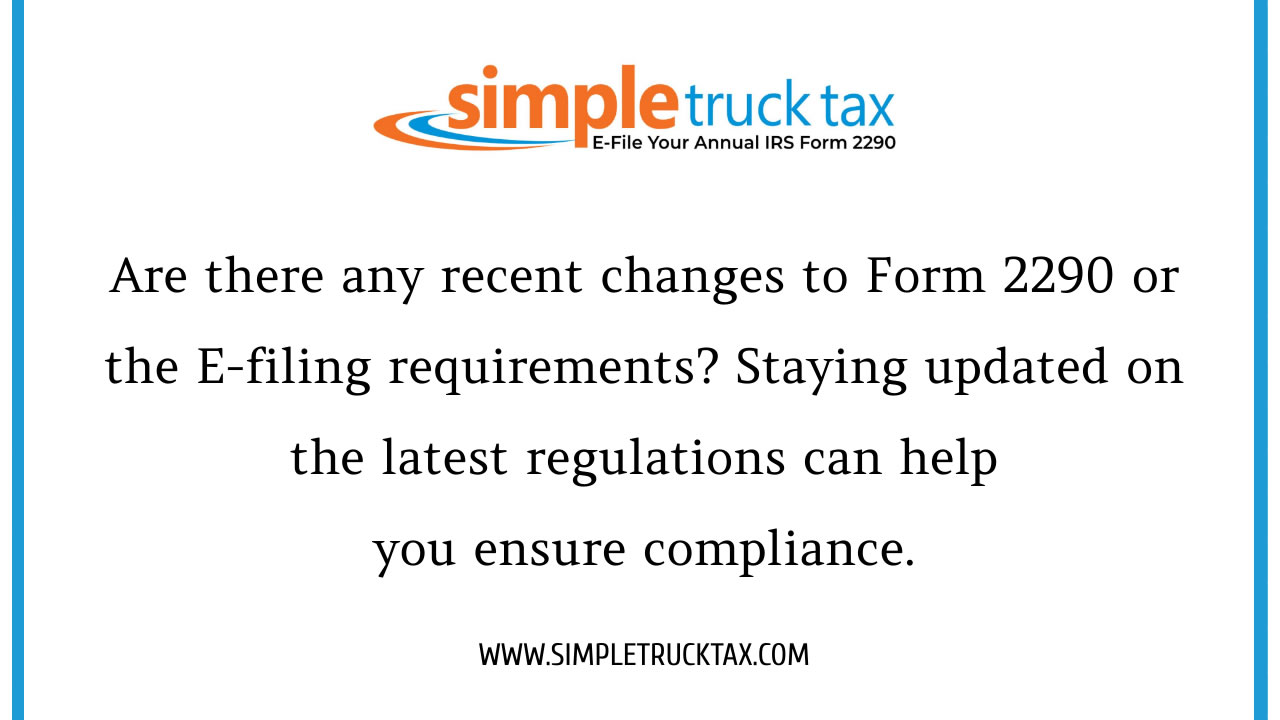10-21-2024
Are there any recent changes to Form 2290 or the e-filing requirements? Staying updated on the latest regulations can help you ensure compliance.
Form 2290, or the Heavy Vehicle Use Tax, is one of the significant taxes truckers pay for vehicles with weight amounting to 55,000 pounds and above. Attentive observation of recent updates is truly crucial in order not to incur any penalty and remain compliant with IRS. At the very start of this year 2024, several changes were made with the guidelines concerning the e-filing of Form 2290. Hence, updating regarding this tax is surely crucial for a business as well as the owner operator. Here is a rundown of the major updates.
Reduced E-Filing Threshold
The IRS has dramatically decreased the threshold of what must be filed electronically effective 2024. For instance, businesses filing 250 or more returns were required to file electronically. Now, it can stand at *10 or more returns* per tax period. This new threshold leaves many more businesses and trucking companies forced into e-filing, with their systems needing to be prepared for this change. Amendments and some other filings must now be e-filed, which means the IRS is continuing its drive for digital efficiency.
Filing Deadlines and Requirements for New Vehicles
Form 2290 is due by the last day of the month following the month in which a taxable vehicle first uses public highways. For example, if a vehicle is used for the first time in *July 2024*, it shall be reported by *September 3, 2024*. Each new vehicle shall be separately reported, and failing to meet these deadlines may add certain penalties or interest charges. Where vehicles are put in service in different months, one needs to file for different periods.
Specific Provisions applicable to Certain Vehicles
Particularly, other qualified blood collector vehicles and specially designed mobile machinery are exempted from the HVUT. Exemption for these vehicles requires that some of them have to meet stipulated requirements as set by the IRS. For instance, the IRS holds that to qualify as mobile machinery, for instance, its primary use has to be other than transportation, such as construction or mining, and public highways have to be incidentally used.
Benefits of E-File
One of the major benefits of e-filing Form 2290 is its *fast processing* time as the IRS usually delivers Schedule 1, proof of payment, within minutes or hours after the submission. In addition, e-filing reduces errors more than paper filing and hence this prevents such delays. With the threshold for mandatory e-filing lowered, truckers and businesses ought to consider using e-filing platforms if they have not already.
Penalty for Non-Compliance
The IRS levies penalties for failure to file within the appropriate time or for misfiling. Penalties include a percentage amount of total tax and can multiply after a long time, in case the filing time is too delayed. The IRS has also clarified that digital filings are strictly monitored. Thus, it is important to maintain timely compliance.
Maintaining Compliance under New Changes
More updates from the IRS talk about modernization and streamlining procedures about returns. Thus, it would be imperative to keep updated with the latest changes regarding Form 2290 and e-filing. Actually, with this new e-filing threshold of 10 or more, many businesses will need to embrace these digital solutions to stay in line. Besides, monitoring vehicle classification and filing deadlines will keep truckers away from an unnecessary accumulation of penalties.
Staying compliant ensures that not only do the workings of your business run smooth, but also that the relationship you have with the IRS is kept very positive in the long haul.
Note: For more information, visit IRS website


